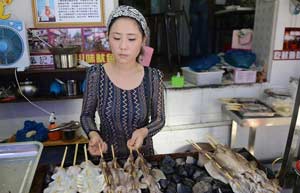

BEIJING -- China's certified public accounting industry has grown to be worth over 50 billion yuan since the sector was re-established in the 1980s.
Significant regulatory developments have accompanied its rapid progress. One regulatory step China has taken ahead of Europe and the United States is mandatory rotation of auditing firms.
The idea of forcing companies to change bookkeepers gained momentum after the 2008 global financial crisis. Taxpayers were furious that some banks were given a clean bill of health but later rescued using public cash.
The Europe Union moved closer earlier this month to put mandatory rotation into practice, Reuters reported.
In the US, the House of Representatives Financial Services Committee passed a bill in July that would block mandatory rotation after the Public Company Accounting Oversight Board (PCAOB), an auditor watchdog, debated the measure.
China's Ministry of Finance put in place mandatory rotation of auditors in 2010 for large State-owned financial institutions, among which three of the four biggest Chinese banks selected new auditors last year.
Proponents said the measure could enhance independence by keeping auditors from becoming too cozy with corporate management.
While not addressing particular cases in China, Kenneth Chatelain, partner in public policy and regulatory affairs for PricewaterhouseCoopers International, said mandatory auditor rotation is generally not the best idea.
"Most countries that adopt or propose to adopt mandatory rotation do so for some combination of two reasons, either to enhance auditor independence, or to try and spread work to develop more accounting firms. And in countries that have it, there is no evidence that it does either," Chatelain said.
"Moreover, mandatory audit rotation will likely cause considerable disruption and additional cost to companies as well as audit firms. Management, audit committees and auditors will need to commit significant time and resources to proposals, diverting their attention away from the more important activities that drive quality reporting and audits," Chatelain added.
Contrary to comments that the state-imposed transition might weaken the Big Four's China operations, Chatelain said that will not be the case.
"As the Chinese accounting profession becomes more mature, it's now possible for China to move towards a model that most countries have had all along, which is mostly local ownership of the accounting and auditing firms," Chatelain said.
For those accounting firms serving Chinese companies listed overseas, there is regulatory limbo between Chinese and American regulators, as US regulators demand to see the firms' auditing papers of US-listed companies, and firms are prohibited from sharing the documents under Chinese laws.
The two countries have been trying to find a solution, with the PCAOB signing a memorandum with Chinese regulators in May. But a deal involving the US Securities and Exchange Commission, which has standing lawsuits against the Big Four and BDO, has yet to be reached.
Part of the problem is the pressure on the regulators themselves within their respective governments, Chatelain said.
Auditors have lobbied hard for both sides to find a solution, he said, adding that both governments need to work through their differences.
 Hunan Gold Jewelry Culture Festival kicks off
Hunan Gold Jewelry Culture Festival kicks off
 World's first 1-liter car debuts in Beijing
World's first 1-liter car debuts in Beijing
 Paper-made furniture lights up art show
Paper-made furniture lights up art show
 Robots kick off football match in Hefei
Robots kick off football match in Hefei
 Aerobatic team prepare for Aviation Convention
Aerobatic team prepare for Aviation Convention
 China Suzhou Electronic Manufacturer Exposition kicks off
China Suzhou Electronic Manufacturer Exposition kicks off
 'Squid beauty' and her profitable BBQ store
'Squid beauty' and her profitable BBQ store
 A day in the life of a car model
A day in the life of a car model